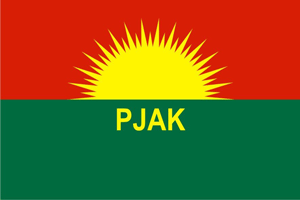 Eric Bruneau
Eric Bruneau
In an interview given in the Qandil Mountains, Mr Karimi, from the PJAK coordination office, was asked if the PJAK and the PKK, with whom it shares a revolutionary agenda and a common ideology, were conducting joint military operations. “Until now, the answer is no.”, did he say. “But it could happen. Our military installations, base camps, observation posts or else, are often very close to each other. Of course, the PJAK will not remain passive if ever a PKK position on the hill next to ours comes under attack.” But, he added, it is not due to the fact the PKK is a sister organisation. “We have strong links with the PKK, it is true, but it is not because of that. It is because we are all Kurds. We would come to the rescue of the KRG Peshmerge the same way if they were attacked.” Mr Karimi seized the opportunity to remind that the PJAK already fought off several Iranian army forays in Iraqi Kurdistan, around Shino and Piranshehir.
“Nonetheless your question poses the problem of the cooperation between Turkey and the Islamic Revolution regime. This problem has not been addressed.”
“These two states allied themselves to resist the developments occurring in the rest of the world – developments which, ultimately, will bring their demise. One of their common points is their anti-Kurds policy. They encourage nationalist feelings amongst their own population, while their state propaganda presents Kurds as a terrorist threat, to justify the increasing militarisation of their society” Mr Karimi then points at the responsibility of the US diplomacy. “In classifying the PJAK or the PKK as “terrorist” organisations, the USA is legitimising this militarisation of the society, and vindicates the Turkey-Iran military cooperation.” According to him, this cooperation takes now worrying proportions. “When the AK party came to power in Turkey, it started immediately to build ties with the Islamic Revolution regime. These ties became stronger and stronger, with two main consequences. At first, we see secularism agonising in Turkey. Then, more crucially for us Kurds, we see Iran preventing the resolution of the Kurdish issue in Turkey, to strengthen the alliance Turkey-Iran.”
Mr Karimi then talks about the important support Turkey provides to Iran in its war against the PJAK. In 2006, he said, a meeting between Iranian and Turkish generals saw the implementation of a counter-insurgency programme, the “anti-PJAK plan”. “This plan is about the military support and intelligence sharing in the war against the Kurdish movement. But one of the aspects of the plan is about the creation of clandestine death squads destined to operate in Iranian Kurdistan, where they would commit murders and put the blame on the PJAK, to discredit us in the eyes of our people.” In an article published the 25/05/2011 on the website www.mesop.de, Mr K. Bokani, a PJAK representative in Europe, denounces the “plan anti-PJAK” and writes that the Iranians received the assistance of members of the JITEM. This clandestine unit of the Turkish gendarmerie, whose very existence is denied by the Turkish state, came to the headlines for its activities in the war the Turks led against the PKK. The JITEM was, alongside the militias of “village guards”, Kurd collaborators armed by Ankara and responsible for numerous human rights abuses, a crucial element of the government’s counter-guerrilla policy.
Mr Bokani says JITEM officers helped to train and shape the death squads the Tehran regime sent to operate in Iranian Kurdistan. “There have been several incidents involving those units.” continues Mr Karimi. “Some of those groups were not very discreet and came to be clearly identified: the regime found itself in the situation on having to arrest and prosecute its own clandestine operatives. There was as well the terrorist attack during the military parade in Mahabad. It was an attack perpetrated by the Iranian secret services. The target was Kurdish clans who support the Iranian government and who were present at spectators at the parade. The aim of the operation was to alienate the PJAK, to show them as murderers of Kurds. Finally there was, recently, the murder of four natural park guards in the Kurdistan province. The PJAK has been blamed, but those men were assassinated by the pasdaran [Iranian Revolutionary Guards Crops]. Those death squads operations are just one part of the “plan anti-PJAK”. The plan is not limited to military issues; it covers a very much wider field. It deals too with assimilation policies, the sealing of the border with a “security wall”, the ways of controlling the Kurds and progressively dissolves their identity, these kinds of things.”
Mr Karimi then talks about the Damas agreements, signed in February 2011. “That agreement is about suppressing visa requirements between Iran, Turkey, Iraq and Syria. It is, officially anyway, about easing communications and commercial exchanges. But there are too military aspects. More specifically in the section dedicated to the Turkish-Iranian agreements, you can see that one goal is to discourage the Kurds to build a national movement and break their unity. As well the Turks are to use their influence on the Azeri community in Iran to keep them away from the pro-democracy contestation movement. They will too provide help in training the anti-riot squads of the Iranian police, those who will be deployed, precisely, to stifle the contestation movement.”
Mr Karimi concludes with a warning: “The Iranian demonstrators only see in these agreements, and in the increasing military cooperation between their country and Iran, their anti-Kurd aspects. And so they don’t mind. They are wrong: they don’t see that this cooperation will turn against them, sooner rather than later. They are themselves prime targets for the Iranian police state. As well, no democratic regime will be built in Iran without the Kurdish issue to be resolved.”